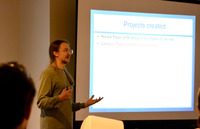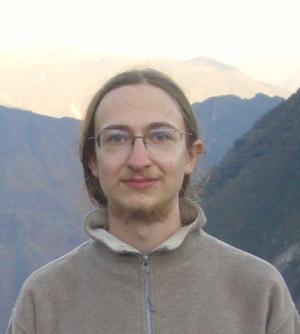ELSI Blog
64 A Constellation of Projects at the MOL Workshop at RIKEN
 Two blog posts ago, Nathaniel Virgo reported about the intial part of a five-week workshop on Modeling Origins of Life (MOL), the first two weeks of which were held at ELSI, in Tokyo. Here I am following up with some impressions of the next three weeks, sponsored by RIKEN, and held in Kobe in the Center for Planetary Science (CPS).
Two blog posts ago, Nathaniel Virgo reported about the intial part of a five-week workshop on Modeling Origins of Life (MOL), the first two weeks of which were held at ELSI, in Tokyo. Here I am following up with some impressions of the next three weeks, sponsored by RIKEN, and held in Kobe in the Center for Planetary Science (CPS).
I'm trying to assemble a list of the various topics and projects that we worked on over the last five weeks. It's a daunting task. In the first two weeks, the topics were fairly well-defined and so I can list them easily enough, but in these last three weeks the style of work has been very different. Each day I've come in to find myself bouncing from interesting conversation to interesting conversation, over a wide range of topics and ideas. Always there's been a bit of a break in the mornings when people have had to go off and make Skype calls or discuss writing the review paper, but over lunch things pick up again and there's a new slew of ideas. It seems chaotic and disorganized, but from that chaos the most important product that has emerged has been an awareness of the thought processes of the fellow attendees - an idea of what areas of research hold burning questions for them which need to be resolved, and where our techniques can help each other.
Our headquarters for this particular flurry of activity is the Center for Planetary Science. While everyone has a guest office they can use for calls and side-meetings, the central area is open and inviting (thanks in no small part to the snacks, barley tea, and coffee provided to us by the efforts of Miyuki Tsubochi, Yuko Wakamatsu, and Masako Hashimoto), and many of us have chosen to just work together there most of the time. This means that whenever anyone has something they want to show, or an idea they want to discuss, there's a group ready to take up the discussion with them.
But I promised a list of topics, so I'll give it a try. We discussed measuring evolutionary activity using the metrics developed by Norman Packard, and implemented that for a couple artificial chemistry and population genetic models. We discussed non equilibrium phase transitions, their difference from the equilibrium cases, and their relevance to the major events in the progress of life - something we're calling Abstraction Transitions; this included an intense and productive talk with Hayato Saigo about how such systems might be able to drive themselves around the phase space and 'detect' transition boundaries far away. This later turned into some work with Nathaniel Virgo and Cameron Smith (participating remotely) to detect and analyze absorbing state transitions in repeated numerical experiments using Infomap. With Steen Rasmussen and Nathaniel, we looked at physical models (Navier-Stokes) and abstract models (dynamic Monte Carlo) for the division of oil droplets in the presence of surfactant, related to his work on creating a protocell in the lab - a pair of simulations came out of that. We had a visit from Professor Ueda, who gave a talk and ended up helping us construct exploratory chemistry models with his state-space visualization software. We looked at how to build enzymes in Hutton chemistry (Mateo Monti and Koichi Nakamura) and what that says about the need for non-specific interactions in models of sparsity.
This list is already getting quite long, and its impossible to do justice to any of those discussions in this space; I haven't even mentioned the work on writing a 'preview' paper, or the framework for computational generative chemistry that we started to build, or the new working group Piet suggested we form during the last day - trying to understand the role of digitality and individuality. You can get an idea of some of what we've been doing on the MOL wiki (http://www.m-o-l.org/wiki).
Somehow despite the heat, the humidity, and the rain we've managed to make this an incredibly energetic three weeks in Kobe. Each day seems to bring with it new ideas, new projects, and new connections - things we will continue to explore together even after we've left.
In closing, on behalf of all of us participants, I would like to thank RIKEN for sponsoring these three weeks, also to Prof. Yoshitsugu Nakagawa, the director of CPS for providing the venue and the help of his staff. Finally, a big thank you to Miyuki Tsubouchi, Yuko Wakamatsu, Yasuko Takimoto, Machiko Matsusue, Asako Sato, and Hanako Ricciardi for taking care of our questions, various needs, our travel and per diem arrangements.












